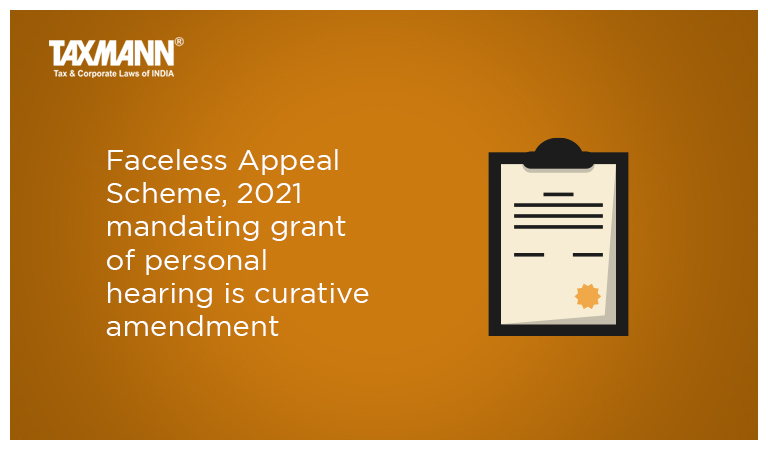Faceless Appeal Scheme, 2021 mandating grant of personal hearing is curative amendment
- Blog|News|Income Tax|
- 2 Min Read
- By Taxmann
- |
- Last Updated on 4 July, 2022

Case Details: Bank of India v. ACIT - [2022] 140 taxmann.com 41 (Mumbai - Trib.)
Judiciary and Counsel Details
-
- Pramod Kumar, Vice-President and Aby T. Varkey, Judicial Member
- C. Naresh for the Assessee.
- Dr. Mahesh Akhade for the Revenue.
Facts of the Case
The instant appeal was filed by the assessee with the respect to the denial of the opportunity to present its case through video conferencing as specified under the Faceless Appeals Scheme 2020.
Assessee stated that it had made submission on 17-08-2021 and prayed to allow the opportunity of being heard through video conferencing mode. Despite this specific request, the assessee has declined an opportunity for hearing and NFAC simply proceeded to dispose of the appeal based on material on record.
Revenue submitted that under the Faceless Appeals Scheme 2020, the granting of opportunity through video conferencing was not mandatory. It was at the sole discretion of the authority concerned to grant or not to grant the video conferencing hearing.
ITAT Held
The Mumbai Tribunal held that as per Rule 12 of the Faceless Appeals Scheme 2020, once a request is made for the hearing through video conferencing, it was incumbent upon the Chief Commissioner or the Director-General concerned to either grant the opportunity or decline the same.
However, in view of the Faceless Appeals Scheme 2021, which has come into effect from 28-12-2021 in supersession of the Faceless Appeals Scheme 2020, a specific call on the request for video conferencing hearing is not necessary.
While rule 12(2) of the Faceless Appeals Scheme 2021 provides that the appellant may request for personal hearing to make his oral submissions or present his case. Further, rule 12(3) ensures that such a personal hearing will invariably be granted, on-demand, through video conferencing.
As a result of these provisions in the new rules, the opportunity of a personal hearing, through video conferencing, is to be granted in all such cases in which the request for a personal hearing is made.
In any event, it is an amendment in the faceless appeal rules which is meant to obviate the undue hardships of the assessee in presenting their cases to the first appellate authority. When such an amendment is made to cure the shortcomings of the scheme, and thus obviate the unintended hardships to the taxpayers, the amendment is to be treated as retrospective in effect.
It is for the reason of the well-settled legal position that a curative amendment in the law is to be treated as retrospective in nature even though it may not state so specifically.
Thus, the matter was to be remanded back to the first appellate authority for adjudication de novo after allowing a personal hearing.
Disclaimer: The content/information published on the website is only for general information of the user and shall not be construed as legal advice. While the Taxmann has exercised reasonable efforts to ensure the veracity of information/content published, Taxmann shall be under no liability in any manner whatsoever for incorrect information, if any.

Taxmann Publications has a dedicated in-house Research & Editorial Team. This team consists of a team of Chartered Accountants, Company Secretaries, and Lawyers. This team works under the guidance and supervision of editor-in-chief Mr Rakesh Bhargava.
The Research and Editorial Team is responsible for developing reliable and accurate content for the readers. The team follows the six-sigma approach to achieve the benchmark of zero error in its publications and research platforms. The team ensures that the following publication guidelines are thoroughly followed while developing the content:
- The statutory material is obtained only from the authorized and reliable sources
- All the latest developments in the judicial and legislative fields are covered
- Prepare the analytical write-ups on current, controversial, and important issues to help the readers to understand the concept and its implications
- Every content published by Taxmann is complete, accurate and lucid
- All evidence-based statements are supported with proper reference to Section, Circular No., Notification No. or citations
- The golden rules of grammar, style and consistency are thoroughly followed
- Font and size that’s easy to read and remain consistent across all imprint and digital publications are applied



 CA | CS | CMA
CA | CS | CMA
